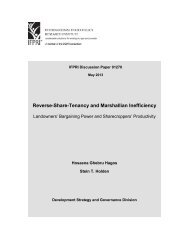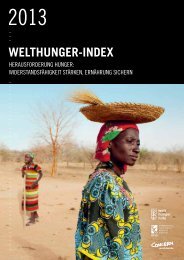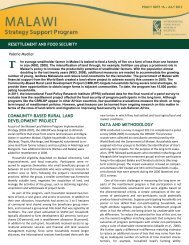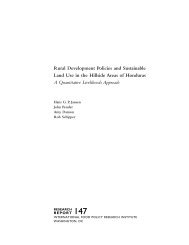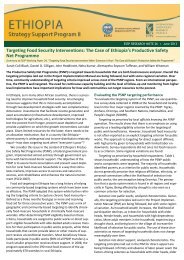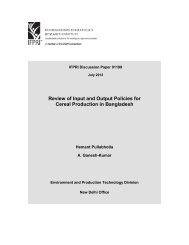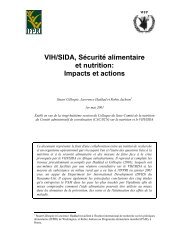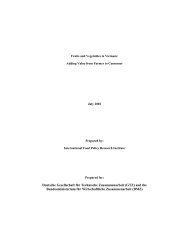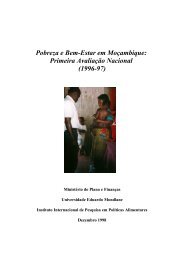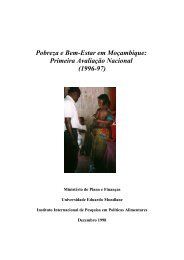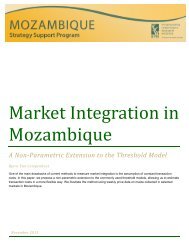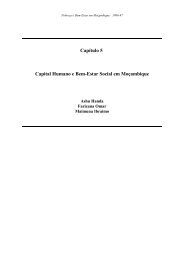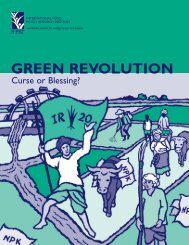Constraints to Increasing Agricultural Productivity in Nigeria: A Review
Constraints to Increasing Agricultural Productivity in Nigeria: A Review
Constraints to Increasing Agricultural Productivity in Nigeria: A Review
You also want an ePaper? Increase the reach of your titles
YUMPU automatically turns print PDFs into web optimized ePapers that Google loves.
(GPS) affects productivity, especially of the poultry subsec<strong>to</strong>r. A related problem is the collapse<br />
throughout the entire country of the breed<strong>in</strong>g and multiplication programs for lives<strong>to</strong>ck.<br />
Furthermore, while the breed<strong>in</strong>g programs were still active, there was little or no recordkeep<strong>in</strong>g<br />
as a basis for breed selection (PCOL 2003).<br />
Process<strong>in</strong>g and Market<strong>in</strong>g <strong>Constra<strong>in</strong>ts</strong><br />
Lives<strong>to</strong>ck market<strong>in</strong>g <strong>in</strong> <strong>Nigeria</strong> has traditionally taken the form of movement of animals from the<br />
lives<strong>to</strong>ck-produc<strong>in</strong>g areas, ma<strong>in</strong>ly <strong>in</strong> the north, <strong>to</strong> the southern term<strong>in</strong>al markets. The animals<br />
transported are ma<strong>in</strong>ly cattle, sheep, and goats. Lives<strong>to</strong>ck market<strong>in</strong>g and process<strong>in</strong>g constra<strong>in</strong>ts<br />
<strong>in</strong> <strong>Nigeria</strong> <strong>in</strong>clude poor packag<strong>in</strong>g facilities for products <strong>in</strong> the value cha<strong>in</strong>s, lack of cold s<strong>to</strong>rage<br />
facilities <strong>in</strong> abat<strong>to</strong>irs at wholesale and retail markets, and absence of standards for meat and<br />
other lives<strong>to</strong>ck and poultry products.<br />
Veter<strong>in</strong>ary Services <strong>Constra<strong>in</strong>ts</strong><br />
Public veter<strong>in</strong>ary services have decl<strong>in</strong>ed over time <strong>in</strong> <strong>Nigeria</strong>. Lives<strong>to</strong>ck diseases account for 30<br />
<strong>to</strong> 40 percent of the losses <strong>in</strong> the productivity of animals <strong>in</strong> <strong>Nigeria</strong> (PCOL 2003).<br />
Graz<strong>in</strong>g Reserves and S<strong>to</strong>ck Routes <strong>Constra<strong>in</strong>ts</strong><br />
Transhumant pas<strong>to</strong>ralists own over 85 percent of the rum<strong>in</strong>ant population <strong>in</strong> <strong>Nigeria</strong>. The<br />
pas<strong>to</strong>ral system relies on natural rangeland for rum<strong>in</strong>ant feed<strong>in</strong>g. The system operates under<br />
difficult arid and environmental conditions. Dim<strong>in</strong>ish<strong>in</strong>g availability of water and graz<strong>in</strong>g pastures<br />
poses a cont<strong>in</strong>u<strong>in</strong>g challenge. Increased cropp<strong>in</strong>g activities have reduced the available water<br />
and graz<strong>in</strong>g resources, lead<strong>in</strong>g <strong>to</strong> conflicts among pas<strong>to</strong>ralists, fishermen, and farmers.<br />
Feeds constitute more than 50 percent of the <strong>to</strong>tal costs of poultry production <strong>to</strong>day <strong>in</strong> <strong>Nigeria</strong>.<br />
Most of the major poultry companies <strong>in</strong> <strong>Nigeria</strong> locally source virtually all the constituents of their<br />
poultry feeds, <strong>in</strong> an attempt <strong>to</strong> conserve foreign exchange. Maize, which constitutes at least 60<br />
percent of the feed components, is either purchased from neighbor<strong>in</strong>g farms or sourced from<br />
poultry-company-owned farms. Other feed components purchased from farmers <strong>in</strong>clude<br />
sorghum, soybeans, and dried cassava. This development therefore shows mutual dependency<br />
among the lives<strong>to</strong>ck and the crop subsec<strong>to</strong>rs <strong>in</strong> the country. The relationship assures benefit<strong>in</strong>g<br />
farmers a steady market and price for their crop harvests.<br />
Lives<strong>to</strong>ck Trade Policy <strong>Constra<strong>in</strong>ts</strong><br />
The <strong>Nigeria</strong>n poultry <strong>in</strong>dustry has experienced productivity and market<strong>in</strong>g problems for years.<br />
Until 2001, frozen broiler and turkey meats were imported at no more than half the price of<br />
locally produced equivalents. Thus, the <strong>in</strong>dustry, fac<strong>in</strong>g the problem of high production costs,<br />
found it difficult <strong>to</strong> compete with imported poultry products.<br />
Government has <strong>in</strong>tervened s<strong>in</strong>ce 2002 <strong>in</strong> by selectively bann<strong>in</strong>g on the importation of poultry<br />
products, pr<strong>in</strong>cipally frozen poultry meat. The <strong>in</strong>tervention is partial because hatchable eggs still<br />
are imported s<strong>in</strong>ce the country does not have any local source of grandparent s<strong>to</strong>ck (GPS).<br />
Also, there is no ban on the importation of table eggs, probably because of the risks <strong>in</strong>herent <strong>in</strong><br />
transport<strong>in</strong>g eggs.<br />
Top on the list of problems fac<strong>in</strong>g the local poultry <strong>in</strong>dustry is the <strong>in</strong>stability of the government’s<br />
policies regard<strong>in</strong>g poultry products and the importation of feed <strong>in</strong>gredients. Before the ban on<br />
50



